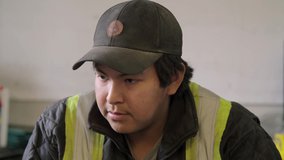New release
Coming
None
Don't Blink
2003
1 min
Leaving soon
Conjuguant marionnettes filmées image par image et animation de dessins, Don't Blink nous montre une jeune femme un brin mélancolique sur un quai de Halifax, dont la solitude est troublée par le passage d’un improbable chalutier. Une métaphore sur la propriété connective des étendues d’eau, sur la capacité de cet élément de se révéler comme une voie ouverte vers la liberté. < Le thème central de cette première édition était « L’eau et notre rapport à celle-ci ».

-
 Hothouse2003 14 editions
Hothouse2003 14 editions
Details
Conjuguant marionnettes filmées image par image et animation de dessins, Don't Blink nous montre une jeune femme un brin mélancolique sur un quai de Halifax, dont la solitude est troublée par le passage d’un improbable chalutier. Une métaphore sur la propriété connective des étendues d’eau, sur la capacité de cet élément de se révéler comme une voie ouverte vers la liberté. <
Le thème central de cette première édition était « L’eau et notre rapport à celle-ci ».
Le thème central de cette première édition était « L’eau et notre rapport à celle-ci ».
-
directionHeather Harkins
-
mentoring directorChristopher Hinton
-
producerMichael Fukushima
-
executive producerDavid Verrall

















